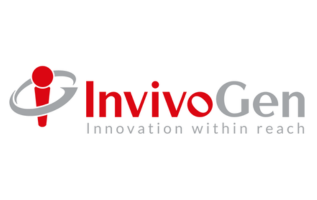Overview
InvivoGen offers a comprehensive range of reagents, engineered cell lines and assay kits to meet your research needs in innate immunity and mammalian cell expression. For cell culture, we provide solutions for microbial contamination, plus selective antibiotics and an endotoxin detection kit. InvivoGen also provide an expanding collection of reporter cell lines to monitor intracellular signalling pathways induced by cytokines or by pattern recognition receptor (PRR) ligands. For major PRR signalling pathways, InvivoGen offer families of relevant ligands, inhibitors and antibodies. Moreover, InvivoGen have a large choice of human and murine genes, cellular promoters, and cloning and expression vectors for different applications
Cell Culture Reagents
InvivoGen provides a wide range of high-quality reagents for tissue and cell culture applications, including mycoplasma detection, prevention and elimination, plus various antimicrobial agents, selective antibiotics, reporter detection kits, the transfection reagent LyoVec™, the transfection enhancer NATE™, and an endotoxin detection kit. These products are functionally validated and undergo strict quality control.
Antimicrobials
InvivoGen has top-quality reagents to avoid and treat cell culture contamination.
Mycoplasma Detection Kits
MycoStrip
MycoStrip™ is a simple and rapid test for the detection of mycoplasma contamination in cell cultures. It is based on isothermal PCR and the results are clearly visualised on a lateral flow detection strip. It is ideal for immediate testing (e.g. upon reception of a new cell line) allowing you to swiftly combat contamination with anti-microbial agents such as Plasmocin® or Plasmocure™.
- One band = negative for mycoplasma
- Two bands = positive for mycoplasma
Key features of MycoStrip:
- Simple: Easy to perform, and unlike most other mycoplasma detection assays, no special lab equipment is required.
- Rapid: Performed in 1 hour, with less than 15 minutes of hands-on time.
- Clear: Fast and easy-to-interpret results that appear within 2-5 minutes, as 1 or 2 bands on the strip.
- Specific: MycoStrip™ has been specifically designed to detect the Mycoplasma and Acholeplasma species that most commonly contaminate cell culture.
- Sensitive: MycoStrip™ is able to detect as low as 10-10^2 CFU/ml, thus can be used to detect mycoplasma contamination before it significantly affects experimental results, which typically occurs at ~10^7 CDU/ml.
PlasmoTest
PlasmoTest™ is the first cell-based assay for the visual and colorimetric detection of mycoplasma contamination in cell cultures. It is ideal for routine cell culture testing as it requires minimal hands-on time, provides clear results, and is able to detect the presence of both mycoplasma and bacteria.
[NEW] TiGer Tet-on System - Inducible Protein Expression
Conditional expression of proteins in mammalian cells is favoured over stable expression in a variety of basic and applied research areas, including functional genomics, gene therapy, biopharmaceutical protein production, and drug screening. Depending on experimental requirements, researchers can efficiently activate or suppress a gene of interest (GOI) at will, using different systems based on the E. coli Tn10-specified tetracycline-resistance operon.
InvivoGen offers such a system, named TiGer (Tetracycline-induced Gene expression or repression) system, which comprises two RepTor™ cell lines and two series of pTiGer plasmids (cloning and control vectors):
- RepTor™ cell lines: HEK293 and A549 cells constitutively expressing the tetracycline repressor protein (TetR)
- pTiGer-mcs plasmids: Cloning of a gene of interest (GOI) downstream of a Tet-inducible promoter
- pTiGer-reporter plasmids: Tet-inducible expression of a reporter gene (controls)
Features:
The TiGer system has been specifically designed to allow the controlled expression of cytotoxic genes.
- Minimal GOI background expression without tetracycline
- Strong GOI expression with tetracycline
Cell Lines
InvivoGen offers a large panel of human and mouse cell lines. These cell lines are designed to:
- Study specific gene function(s)
- Investigate cell signalling pathways and signal transduction
- Screen for agonists/antagonists of pattern recognition receptors (PRRs), such as
- Toll-like receptors (TLRs), C-type lectin receptors (CLRs), cytosolic DNA sensors (CDSs), and aryl hydrocarbon receptor (AhR)
- Control the expression of cytotoxic genes
- Screen for toxic protein inhibitors
- Measure cytokine production
- Validate antibody functions
InvivoGen offers immortalised cell lines, isolated from various human or mouse tissues, that are widely used for in vitro biomedical research:
Most of InvivoGen’s cell lines express an NF-κB-inducible SEAP (secreted embryonic alkaline phosphatase) and/or IRF-inducible Lucia luciferase. Both reporter proteins are secreted and thus can be readily detected in the cell supernatant using the appropriate detection reagent.
Seven major families of reporter cells are available to meet your research needs:
- Transcription factor reporter cells (NF-κB, IRF, or NFAT pathways)
- PRR reporter cells (TLRs, CLRs, CDSs & STING, NLRs, RLRs, AhR,
- ALPK1/TIFA, inflammasomes)
- Cytokine reporter cells
- ADCC and ADCC cellular assays
- Immune checkpoint cellular assays
- Autophagy reporter cells
- COVID-19 reporter cells
InvivoGen’s cell lines are extensively tested for viability, stability, biological activity, and absence of mycoplasma to ensure strong and reproducible results. Moreover, we provide detailed handling and experimental procedures for all cell lines, to minimise the need for optimisation or troubleshooting by the end-user.





